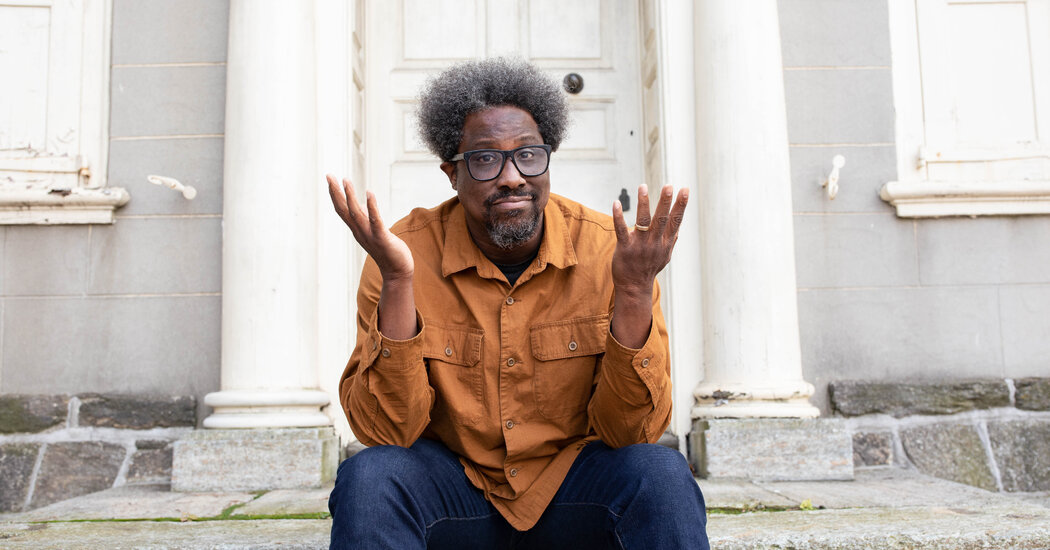Five articles from around The Times, narrated just for you.
This weekend, listen to a collection of narrated articles from around The New York Times, read aloud by the reporters who wrote them.
‘We Need to Talk About Cosby.’ (Among Others.)
There is a simple, amazing thing that W. Kamau Bell does in his Showtime documentary series, “We Need to Talk About Cosby.” While interviewing subjects about the comedian and actor accused of multiple rapes, Bell has them watch scenes of Bill Cosby’s performances on a tablet.
The interviewees — entertainers, experts, women who have accused Cosby of sexual abuse — hold a small screen in their laps. The device makes them turn their faces downward, lighting up at warm childhood memories or registering disgust at punch lines that now ring horrific.
It’s a small gesture, but it’s important. You have to hold in your head what you know about Bill Cosby the man. And you have to hold literally in your hand what you know about Bill Cosby’s work.
“We Need to Talk About Cosby” holds Cosby’s achievements and his wrongs close, and it recognizes that there may be unresolvable dissonance between the two.
Climate Change Enters the Therapy Room
It would hit Alina Black in the snack aisle at Trader Joe’s, a wave of guilt and shame that made her skin crawl.
Understand Bill Cosby’s Sexual Assault Case
Bill Cosby was released from prison June 30, 2021, after the Pennsylvania Supreme Court overturned his 2018 conviction for sexual assault.
- Why He Was Released: Here’s a breakdown of the issues surrounding the ruling to overturn the conviction.
- What Legal Analysts Think: The court’s decision opened an unusually vigorous debate among the legal community.
- His Uncertain Future: Experts say it’s unlikely the ruling will change the public perception of the former star.
- The Aftermath: The Times critic Wesley Morris looks at what to do with our fondness for “The Cosby Show,” and W. Kamau Bell’s documentary series contextualizes his legacy.
Something as simple as nuts. They came wrapped in plastic, often in layers of it, that she imagined leaving her house and traveling to a landfill, where it would remain through her lifetime and the lifetime of her children.
Black, 37, longed, really longed, to make less of a mark on the earth. But she had also had a baby in diapers, and a full-time job, and a 5-year-old who wanted snacks. These conflicting forces were slowly closing on her, like a set of jaws.
Eco-anxiety, a concept introduced by young activists, has entered a mainstream vocabulary. And professional organizations are hurrying to catch up, exploring approaches to treating anxiety that is both existential and, many would argue, rational.
This Pan Sauce Set My Cooking Free
“So many of the instincts I possess now as a cook can be credited to shows that ran in the late 1990s and early aughts,” the cooking writer Eric Kim writes in this Magazine piece. “We were Food Network Babies, a generation who came home from school to watch cooking programs before dinnertime.”
When he watches those shows now, they remind him of how much slower cooking programs used to be, the antithesis of the flashy antics of today’s YouTube videos or the accelerated ephemera of TikTok.
For those moments when you want to slow down, Eric recommends Madame Gabillet’s chicken, inspired by the cookbook author Melissa d’Arabian. “I made it for the first time after watching d’Arabian’s big ‘Food Network Star’ win years ago, but it was the day I swapped the chicken breast for trout, the lemons for limes and the combination of white wine and chicken broth for all white wine that I realized the power of this pan sauce,” Eric explained. “Culinarily, it set me free.”
Everyone Has Left the Chat
Alex Levy, a yoga teacher and D.J. who lives in Sacramento, is a member of many group chats, including one composed of some hundred friends he’s made at Burning Man. But after a while, he said, the text chains “start to dwindle and fade away.”
Group chats, like all chats, are not meant to go on forever. Scroll to the bottom of your messages and you’ll probably find a conversation long forgotten — a planning chain for a friend’s March 2020 surprise party, or a big group filled with contacts who fell off your social map when virtual happy hours stopped feeling fun. There wasn’t any drama; things just petered off, as they do.
◆ ◆ ◆
Decades Adrift in a Broken System, Then Charged in a Death on the Tracks
Written by Andy Newman, Nate Schweber and Chelsia Rose Marcius | Narrated by Andy Newman
Decades Adrift in a Broken System, Then Charged in a Death on the Tracks
To the homeless men lined up outside Holy Apostles Soup Kitchen in Manhattan, Martial Simon was a familiar figure: often incoherent, usually angry about something.
At 9:37 a.m. on Jan. 15, according to what the police said was his confession, he shoved Michelle Alyssa Go, a 40-year-old stranger, in front of a train at the Times Square subway station. She died instantly.
Mr. Simon, 61, a former cabby and parking-lot manager who immigrated from Haiti at 13 and started showing symptoms of schizophrenia in his 30s, will probably spend the rest of his life locked away.
But his decades adrift in New York, where his lawyer estimates he was hospitalized at least 20 times, illustrate a broken system of care for some of society’s most severely ill members, a failing writ large every few years when another person with a history of psychiatric hospitalization commits an awful act of violence, mental health experts and homeless advocates say.
Want to hear more narrated articles from publications like The New York Times? Download Audm for iPhone and Android.
The Times’s narrated articles are made by Tally Abecassis, Parin Behrooz, Anna Diamond, Sarah Diamond, Jack D’Isidoro, Aaron Esposito, Dan Ferrell, Elena Hecht, Adrienne Hurst, Elisheba Ittoop, Emma Kehlbeck, Marion Lozano, Tanya Pérez, Krish Seenivasan, Margaret H. Willison, Kate Winslett, John Woo and Tiana Young. Special thanks to Sam Dolnick, Ryan Wegner, Julia Simon and Desiree Ibekwe.


























